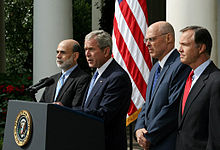Shares worldwide surge due to US government plan
Friday, September 19, 2008
Stock markets around the world, particularly those in the United Kingdom, have increased dramatically today. This is due to the ongoing events in the financial world, including the United States government's announcement that it would buy billions of dollars of bad loans from US banks.
The primary UK index, the FTSE 100, rose in value by 8.04%, which is 392.50 points, to above the 5000 mark at 5272.50. The Dow Jones, was up 3.10% at 14:58 UTC, an increase of 330.89. The Dow Jones currently has a value of 11350.58 points. The NASDAQ index has risen by 2.53% to 2248.63, while the Dax was 5.06% higher than the start of the day as of 14:58 UTC.

The US Treasury described the government's bail-out plan in a press release released earlier today. It said that "The U.S. Treasury Department today announced the establishment of a temporary guaranty program for the U.S. money market mutual fund industry. For the next year, the U.S. Treasury will insure the holdings of any publicly offered eligible money market mutual fund – both retail and institutional – that pays a fee to participate in the program."
Henry Paulson, the US Treasury Secretary, explained the government's reasoning behind its plan. He said that the government was buying bad loans "to restore confidence in our markets and our financial institutions, so they can fuel continued growth and prosperity, we must address the underlying problem."
President George W. Bush, speaking at a press conference alongside Paulson, said "this is a pivotal moment for America's economy."
The government plan is permitted under the Gold Reserve Act of 1934, which gives the Treasury the permission "to deal in gold, foreign exchange, and other instruments of credit and securities."
Sources
edit- "Shares surge on US bail-out plan" — BBC News Online, September 19, 2008
- "Stocks Soar Worldwide on U.S. Action" — The New York Times, September 19, 2008
- Press Release: "Treasury Announces Guaranty Program for Money Market Funds" — United States Department of the Treasury, September 19, 2008
